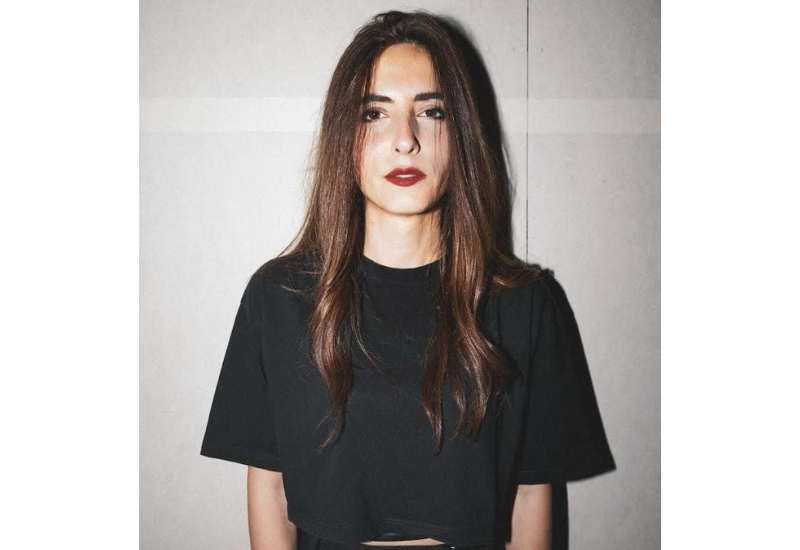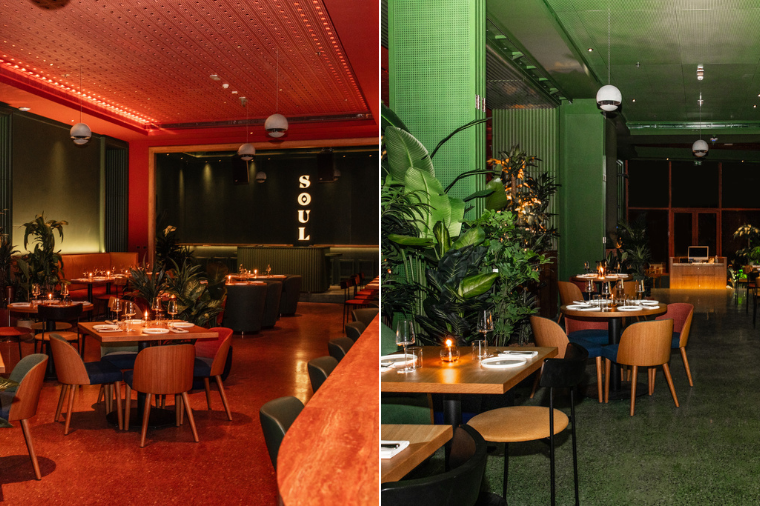Launched by Factory People, the most influential experiential group in the MENA region, Soul Kitchen highlights alternative culture, art and talent beyond its fine-dining concept.
From carefully curated dishes to expertly crafted cocktails, each element on the menu focuses on Levantine influences as the concept of migration inspires creativity at the restaurant.
Having opened in the heart of Business Bay, Soul Kitchen pays an ode to the Arab diaspora, which brings hints of elements from Buenos Aires to Mexico Levantine cuisine.
So, to understand more about the concept, Emirates Woman spoke to Factory People’s co-founder and chief creative officer, Tala Mortada on how it all began and how the restaurant has already made its mark on Dubai’s dining scene.
Talk us through the concept.
When Factory People moved to Dubai, we were among many other Lebanese creatives, companies, and people, who after enduring life threatening events in our home country, looked to do what we do best in a new country, a new home. But this wasn’t the first-time people from the Levant had to leave in flocks, As the influence of Levantine cuisine quickly spread across the whole continent, these dishes became popular as it borrowed from its surroundings and continuously reinvented itself with the ingredients of every region it migrated to. From Shawarma inspired Tacos al pasto to Halawa inspired marzipan and Sambosic inspired Empanadas. The concept of migration is at the heart of our culture, in the Levant, “El Ghorba” is a word we hear over and over again growing up. The concept of migration is at the heart of Soul Kitchen’s story too, which is why the interior is an ode to Soul Kitchen’s spirit animal: The migratory Bird.
View this post on Instagram
Already a popular restaurant in Beirut from Factory People, what inspired you to bring it to this part of the world.
We created Soul Kitchen in Beirut around seven years ago in order to have a space to let loose, have amazing cocktails, and curate music that we listen to at home. It was a first of its kind cocktail bar nested in The Grand Factory, our very first club in Beirut. We wanted to build a place where we belonged, and where our friends could meet up, while still being in a club where some of the biggest artists and DJs in the world are performing on a weekly basis. Soul Kitchen quickly became a space that had a major influence on how we dressed, how we danced, it influenced our drinking culture, and a soul kitchenesque style was established. In Dubai, it serves a very similar purpose: listening to beautiful and interesting curated sounds, having a gorgeous cocktail bar experience, but most importantly: serving delicious food.
The interiors boast a bold look with millennial pink walls, bar, ceiling and flooring – talk us through the inspiration / How does the Dubai location take subtle hints from its OG Lebanese location?
When designing the interior, I really didn’t want to stray too far away from the original Soul Kitchen’s essence, so I kept green as a predominant color, and trees and plants around the place to add life via organic elements, this is contrasted by the warm and cozy terracotta color, along with the very geometric structures and patterns in the woodwork that allows for a more imposing elevated look. Aside from the colors, the geometric “msharrabiya” in the ceiling is an element I purposefully installed throughout one of the ceilings, this also borrowed from the aesthetics of the Beirut Soul Kitchen, and Lebanese architecture as well.
The menu features a myriad of flavors along with Arab and South American flavours – what are the key dishes available?
We are very passionate about the dishes that were carefully created by our Chef Margarita Vaamonde. The Hummus Chimichurri, a revisited levantine Hummus plate using actual green chickpeas and a delicious chimichurri sauce hailing from Argentina and Uruguay. The White Fish Tabboule Ceviche is actually my mother’s tabboule recipe mixed with Chef Margarita’s ceviche, it is one of our most delicious dishes. Our Wagyu Kafta is inspired by the Lebanese Arayes, our take on this dish is with a kafta made of Wagyu beef, served inside an Arepa, a very traditional corn meal bread originally from Venezuela and Colombia.

Factory People’s co-founder and chief creative officer, Tala Mortada
Music plays an important role at the venue – tell us how the restaurant stays on top of this?
Behind our music programming is my partner Wassim Bou Malham, a rockstar producer and musician who is very passionate about music from all around the world. He makes sure we stay on top of the game in terms of sounds that keep Soul Kitchen a space for discovery, of inspiration and of collaboration with interesting artists. Our Monday Jazz nights have taken Dubai by storm, giving our guests the opportunity to be transported by alternative jazz bands from different countries that are redefining the new jazz sounds of today. We also invite diggers and curators from around the world to share their sounds on specific nights. Our latin Sunday nights allow our guests to discover a different Latin American country’s sounds in every edition, last edition was an ode to Colombia and the next one will be about Peru. The weekends are predominantly having a more groovy and dance affair after dinner, making Soul Kitchen a place where our community can perform, listen, eat, drink, or just dance the night away.
Guests can explore Arab migration through installations by acclaimed artists – what are some of the famous art installations?
Behind the bar, is an ever-rotating mechanical installation depicting a flock of birds, designed by myself (Factory People’s co-founder and chief creative officer, Tala Mortada), and creative director Hamza Mekdad. The idea of the installation is to tell the story of the last hundreds of years of people endlessly having to leave their homes in the Levant, in search for inspiration, safety, and a feeling of home. Overarching the green room, stands Rumi Dalle’s installation “Feathers of migrating birds”, where each of the 150 feathers carries the story of a migrating artisan, from Beirut to Dubai, feeding into the concept of Soul Kitchen. Rumi Dalle is an acclaimed artist from Beirut, behind works she handcrafts for Hermes and Iwan Maktabi to name a few. The walls are adorned with carpets curated by Iwan Maktabi, as part of a semi permanent installation that will keep reinventing itself with new collaborations every 6 months, to exhibit works by artists and curators we admire.
View this post on Instagram
What lies ahead for the brand?
A month on from its opening, Soul Kitchen has already established itself as a communal space and an intersection point for the many scenes and subcultures of Dubai. As the space is taking its own positioning in the scene, our offering is also adapting to the latter. Our favorite places are ones that evolve with their guests, we have just recently opened up our terrace, we’re creating a lounge experience and tequila bar in the green room, we are opening a club next door in order to host more sounds and nights that will be mostly centered around music, and bar bistrot on the other side of the restaurant to invite people to have a more relaxed day time experience in the premises as well. We are very excited about the next steps, and about experiencing Dubai through Soul Kitchen’s eyes.
– For more on luxury lifestyle, news, fashion and beauty follow Emirates Woman on Facebook and Instagram
Images: Supplied











